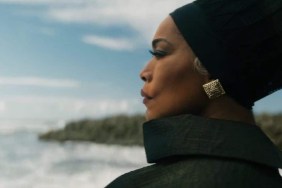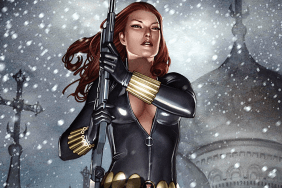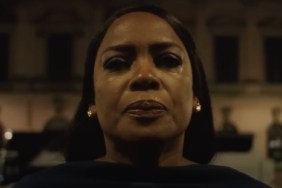
“You gotta follow the white guys,” director Ava DuVernay told a crowd of female bloggers (via The Hollywood Reporter) during her closing keynote address at the 2015 BlogHer Conference, offering up advice for women and minorities looking to make it in their industry. It was an interesting point for the Selma director to make. After all, the conversation has grown louder and louder when it comes to the discussion regarding women and people of color blazing their own trails and charting their own paths to the top in industries that have been primarily dominated by white males.
But according to DuVernay there is an advantage to utilizing the roads paved by those already in positions of privilege and power. “They’ve got this thing wired. Too often, we live within their games, so why would you not study what works? Take away the bad stuff — because there’s a lot — and use the savvy interesting stuff and figure out how they can apply.” Good advice, but DuVernay wasn’t done there.
“Women have been trained in our culture and society to ask for what we want instead of taking what we want. We’ve been really indoctrinated with this culture of permission. I think it’s true for women, and I think it’s true for people of color. It’s historic, and it’s unfortunate and has somehow become part of our DNA. But that time has passed.”
Frankly, I struggle knowing where to begin when it comes to discussing an issue like this, in large part because I simply cannot fit into DuVernay’s shoes, much less walk a mile in them. As I Fantastic Four star Michael B. Jordan took to the internet to respond to criticism over being cast in the (traditionally white) role of The Human Torch in that film — I am a white male, part of the majority. As a human being I can sympathize, but as with Jordan’s comments, I will never fully “get it.” However, that doesn’t mean I can’t highlight an issue when I see it and give someone like DuVernay a greater podium from which to share her opinion. So I am.
Just a short time ago, DuVernay found herself faced with an important decision, namely whether directing Chadwick Boseman in Marvel‘s Black Panther — the studio’s first film about a black superhero — would be the right move both for the film and for her career behind the camera.
To this point, Tim Story is the only black director to have helmed a Marvel movie having directed the first attempt at Fantastic Four and its sequel and Lexi Alexander is the only female to have directed a Marvel movie, having helmed Punisher: War Zone back in 2008. Had DuVernay chosen to direct Black Panther she would have been the first black director and only female director to take on a film in this current iteration of Marvel features, the Marvel Cinematic Universe as it has come to be referred to. As such, DuVernay likely could have had a platform to make just about any movie she wanted thereafter.
Then again, that’s just a theory. The BBC-produced “Celluloid Ceilings: Women Directors Speak Out” (watch just below) goes over the struggle women have faced in Hollywood with interviews with Alexander as well as Catherine Hardwicke, who helmed the first Twilight film to the tune of $392 million worldwide on a $37 million budget only to find she was replaced by men for the subsequent sequels, all of which carried higher budgets.
As for DuVernay, she wasn’t quick to dismiss the prospect of taking on Black Panther. She had an idea for what it could be, and a way to make it her own, and if she was going to direct the film she was going to make it her way, not Marvel’s. She ultimately passed on the project, but there was a brief period of time when she was on board with the idea.
“For me, it was a process of trying to figure out, are these people I want to go to bed with? Because it’s really a marriage, and for this, it would be three years. It’d be three years of not doing other things that are important to me. So it was a question of, is this important enough for me to do?” DuVernay stated in a discussion at the conference moderated by Melissa Silverstein, founder and editor of the IndieWire site Women and Hollywood. She continued:
“At one point, the answer was yes, because I thought there was value in putting that kind of imagery into the culture in a worldwide, huge way, in a certain way: excitement, action, fun, all those things, and yet still be focused on a black man as a hero — that would be pretty revolutionary.”
Indeed it would be, and it seems the studio shared her thinking, or at least understood it. In May we reported Marvel was eyeing either DuVernay or Rick Famuyiwa (Dope) to take on Black Panther. Both DuVernay and Famuyiwa are African-American filmmakers, and both, the thinking went, would lend a different perspective on the Black Panther character and his story than someone who isn’t.
But as Marvel president Kevin Feige told The Hollywood Reporter in June, while diversity is a factor in choosing a director for Black Panther, it isn’t the only factor. “We need to find the best director for any given movie. And that’s really where we always start. If diversity is part of that, it’s great. It’s important. You will start to see things across the industry as a whole change as more filmmakers come up through the ranks and become part of making movies like this.”
Feige’s words strike me as interesting. My question is when exactly we will see the change he talks about and, ultimately, why we have to wait for filmmakers to “come up through the ranks” in order to “become part of making movies like this”. It’s a statement that seems to suggest two things: first, there aren’t any female or minority filmmakers worthy of making these films right now; and second, big-budget blockbuster filmmaking is an exclusive club that female and minority filmmakers haven’t yet earned access to. Either such idea is completely bonkers, if you ask me.
Change never happens overnight, but Feige has the ability to promote and affect change in this arena, though he seems averse to doing so. His studio has been pushed over and over (and over) to make stories about minority characters, and with that comes the idea of getting someone like DuVernay behind the camera to use her own unique perspective to tell one of these stories. Whether Marvel needs a minority filmmaker to tell a story about a minority character is another issue entirely, but with DuVernay now out of the mix, Famuyiwa appears the new frontrunner to direct Black Panther — based solely on those earlier reports — though it’s certainly possible another director will take the reins.
No matter whether it is Famuyiwa or someone else who ultimately directs Black Panther, the opportunity is an alluring one. After all, directing a Marvel film means telling a story to a built-in fan base consisting of millions the world over, a potential audience that is almost certainly bigger and more rabid than the ones DuVernay or Famuyiwa are currently able to reach. Add to that the perceived cultural importance of the central character in this particular Marvel film and this idea, DuVernay says, is one that pulled her deeper into talks with Feige about helming the project.
“These Marvel films go everywhere from Shanghai to Uganda, and nothing that I probably will make will reach that many people, so I found value in that. That’s how the conversations continued, because that’s what I was interested in. But everyone’s interested in different things.”
Those differing interests seem to be where talks broke down, as Essence reported DuVernay and Marvel simply didn’t agree on how to tell Black Panther’s story. Several outlets claimed DuVernay actually signed on for the project before reneging, but the director took it upon herself to set the record straight, telling the magazine, “I think I’ll just say we had different ideas about what the story would be. Marvel has a certain way of doing things and I think they’re fantastic and a lot of people love what they do. … In the end, it comes down to story and perspective. And we just didn’t see eye to eye. Better for me to realize that now than cite creative differences later.”
Indeed it is, as writer-director Edgar Wright realized last year. Wright parted ways with Marvel deep into development on Ant-Man, which opened worldwide this weekend. After Wright walked, Marvel reeled in Adam McKay and star Paul Rudd to rewrite the script and then scrambled to find a director to replace Wright, throwing Peyton Reed (Yes Man) into the director’s chair two months before shooting began. It wasn’t an ideal situation, to say the least, and that appears to be what DuVernay sought to avoid by scoping out Marvel’s intentions before getting into bed with the juggernaut blockbuster factory.
“What my name is on means something to me — these are my children,” DuVernay told Silverstein. “This is my art. This is what will live on after I’m gone. So it’s important to me that that be true to who I was in this moment. And if there’s too much compromise, it really wasn’t going to be an Ava DuVernay film.” That last bit is the real kicker here, and it is a noble stance for someone whose career thus far has centered around making very personal films. There is really no point for DuVernay to sacrifice who she is as a filmmaker just to cash a check and move on.
Marvel has laid out plans for its Cinematic Universe for years to come, likely well beyond the films it has publicly announced, and with those plans comes an outline for its heroes and how their stories weave together. This leaves little wiggle room in how these characters can be portrayed on screen, which isn’t to say the studio lacks originality, but when a director like DuVernay enters into a conversation with a studio like Marvel about how she wishes to tell a story that would take place within its billion-dollar blockbuster universe, the studio clearly has the upper hand. If DuVernay doesn’t want to conform to Marvel’s plans, and thus prefers to make “an Ava DuVernay film,” it only makes sense for her to walk away. After all, Marvel isn’t one to budge.
True to form, it didn’t — it couldn’t — and thus DuVernay won’t be the one directing Black Panther. However, given she now has an idea what Marvel plans to do with the story, DuVernay says she thinks the film “should be good when it comes out,” no matter that Marvel’s approach differs from what hers would have been. Whether that statement was sincere or just an attempt at playing nice, it’s hard to tell, but she closed out the conversation by saying, “I’ll be there, watching,” and the rest of us will be, too, though it will be a different experience without DuVernay behind the camera — for better or worse.









